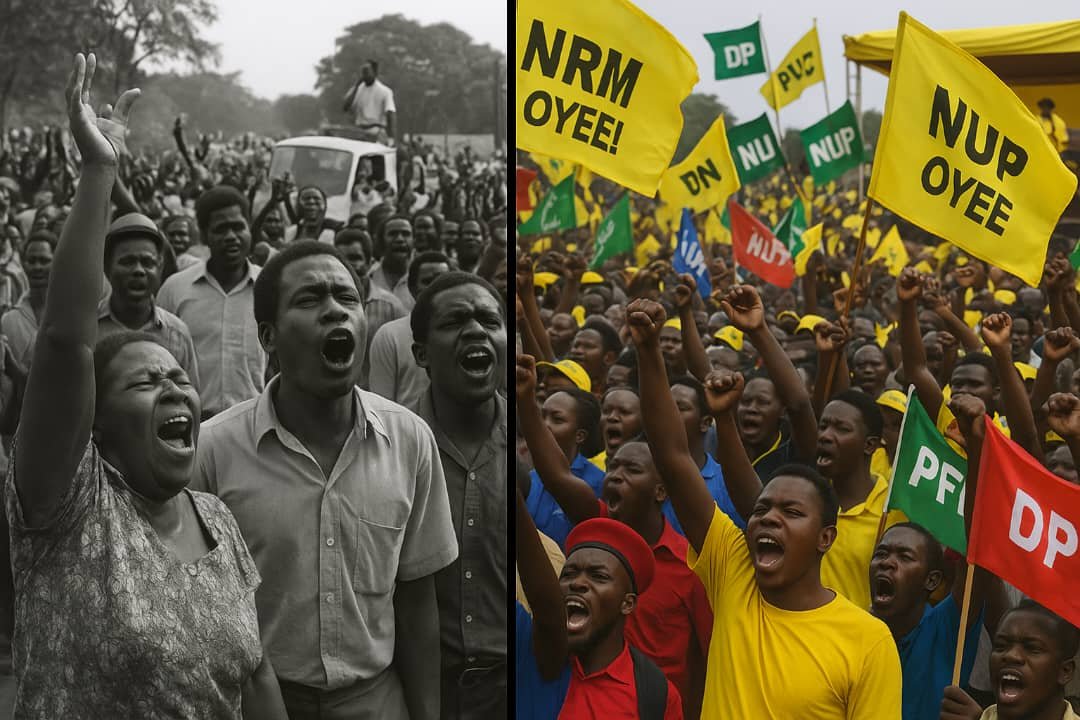By Isaac Christopher Lubogo
> “A nation that forgets how to sing from the soul will one day shout from the throat — without meaning, without music, without memory.”
— An African lament, unwritten but deeply felt
Prologue: The Song of a Neighbour, the Echo of a Generation
The sun had long set, but the wisdom of twilight still glowed on my neighbour’s weathered face. He leaned on his faded stool, cracked heels scraping the ground, and asked me — not with mockery, but with the gentle disdain of a man who has lived to see better days —
“Lubogo, tell me… what do you people even sing for your politicians these days?”
I laughed nervously, as most of us do when we know we are about to be unmasked.
He shook his head, nostrils flaring with nostalgia, and began humming:
> “Ehh… ehh… ehh… Mama… twágála Obote ngá ssente!”
(Oh oh oh Mama, we love Obote like we love money!)
He didn’t stop. His voice cracked with age but soared with memory:
> “Ani yábalimba nti Dókita Obote mumusóbóla? Ehh Mama!”
(Who lied to you that you could ever defeat Doctor Obote? Oh Mama!)
And then he paused, looked straight at me, and delivered the death sentence of my political generation:
“Back then, the crowd was the campaign. The people were the posters. The song was the soul. Obote didn’t have to buy our love — he was the love. Now you chant these Makerere-style, stone-cold, faculty rally slogans: ‘Lubogo oyee!’ ‘NRM oyee!’ ‘NUP oyee!’ ‘DP oyee!’… and end with a half-dead, emotionless ‘Rhaaa.’ No rhythm. No reverence. No reason.”
Part One: Of Songs and Souls — When Politics Had Poetry
Politics in Uganda was once a ballad — not a budgeted performance. You did not sing because you were paid. You sang because you believed.
You sang because that man on the campaign truck embodied your dream. He wasn’t just a candidate. He was an anthem. Every syllable of your chant carried your grandmother’s hope, your father’s frustration, your mother’s tears — and your unborn child’s freedom.
Those crowds sang in unprompted unison, uncoached by campaign managers or social media influencers. There was no need for an emcee to say, “clap here” or “sing now.” The rhythm lived in the people.
> “Mamaaa… Obote ngá ssente…”
Listen again. Not “Obote gives us money.” No!
Obote was money.
The currency was conviction. The denomination was devotion.
Part Two: The Rise of the Rah-Rah Republic
Now fast-forward to today’s rallies.
The candidate arrives late.
The crowd is bored.
The DJ is louder than the vision.
The message is as hollow as the promises.
And what do we chant?
> “Lubogo oyee!”
“Rah rah ehh!”
“PPF oyee, rhaa!”
What does “oyee” even mean anymore? A faint war cry borrowed from somewhere — everywhere — yet belonging to no one. No context. No culture. No chemistry.
The rhythm is imported. The passion is outsourced. The crowd sings because it must, not because it must sing.
This isn’t morale boosting — it’s morale mimicking.
Chapter Three: Phonetics of Passion — Why Our Elders Sang Better
Let us return to the phonetic beauty of the past chants — drawn from deep Luganda intonation:
> “Ehh mamaaa… twágála Obóte nga ssente…”
Notice the elongation of the vowels: “twágála” (we love), “Obóte” (Obote), and the ever-captivating “nga ssente” (like money).
The vowel pulls the heart. The beat holds the soul.
Now compare with the abrupt consonants of today’s chants:
> “NRM! Oyee!”
“NUP! Oyee!”
There is no emotional swell. No build-up. No reverberation in the bones. These are not chants. These are button-presses on a malfunctioning keyboard.
The former had melody. The latter has noise.
The former was an emotional climax. The latter is political autopilot.
Part Four: The Campaign as Communion — When Candidates Were Credo
Back then, when a candidate walked by, the air changed. He was greeted with folk verse, not folding chairs.
People didn’t need branded t-shirts to identify with him — their hearts were the manifesto.
Songs like:
> “Obote yajja nga muzadde – twamwagala n’obugumu!”
(Obote came like a parent — we loved him with warmth and strength!)
Or:
> “Obote bw’aba mulwadde – naffe tusaba!”
(If Obote is unwell — we too shall pray!)
Contrast that with today:
> “How much is he giving?”
“Will there be soda and sugar?”
“How many buses are coming?”
Today’s chants are transaction receipts.
Epilogue: A Nation Without Song Is a Nation Without Heart
> “And how shall we sing the Lord’s song in a strange land?” – Psalm 137:4
Indeed — how shall we sing a song of hope in a land where hope is hired, and crowds are crowdsourced?
My neighbour was not mocking me. He was mourning me.
Mourning a generation that sings only when paid, that chants without content, and that marches without music.
> We have lost the soul in our slogans.
We have buried melody beneath manifestos.
We have replaced the poetry of belief with the photocopies of branding.
Let this be a call — not to restore the man Obote, but to restore the spirit of a people who once sang for what they believed, not for what they received.
> “Mamaaa… twágála Obote nga ssente…”
May we one day sing again like that — for someone who deserves it.
Or better yet — for a vision that transcends them all.
Finis.








